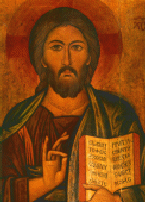|
|
Click here for the full RGT3563/6563H
syllabus (PDF) for the next academic year. The materials
contained on this web-site complement the full syllabus.
|
|
|
*** N.B. Offered
every second year. Next offering: 2006/7. ***
Description: A
comprehensive synthesis of primarily the Byzantine Orthodox doctrinal
tradition. Themes include: the sources of Tradition, creation, eschatology,
anthropology, soteriology, Christ, the Holy Spirit, the Trinity,
liturgy and sacraments, ecclesiology and East-West ecumenism. Lectures,
seminars, short papers, research paper. (Offered every second year).
Prerequisite: Three courses from the Theological or Historical Departments.
Course Evaluation,
Requirements & Due Dates:
TBA
a & b. Reflection
papers:
Reflection papers are based on the reading or topic listed below,
and should be between 1.5-2 pages. See "essay requirements"
below.
i. First paper: Due: TBA
ii. Second paper: Due: TBA
c. Research Essay:
TBA
The research paper is to be 8-10 pages, and should conform to the
"essay requirements" listed below. The essay topic can
be either on the theological history and development of iconography,
or a theological interpretation of any icon(s) of your choosing.
Keep in mind that such an icon(s) should yield enough information
for an 8-10 page essay. Please provide a black-and-white photocopy
of the icon and its source/location. Due: Week 11 (Nov. 27).
d. In-class participation in lectures and tutorials:
Lectures will be the first hour of the class, while the tutorials
will immediately follow the lecture. Students will be expected to
discuss and critique the readings during the lecture and tutorial
sessions.
Essay Requirements:
Research Essays must include a title page, an introductory/thesis
paragraph, the main body of text (ideas, arguments, critique), endnote
or footnotes, a concluding/summary paragraph, and a bibliography.
The research essays are composed of synthesis and critical analysis
of a theme/idea/event in systematic theology and/or historical theology,
and are presented from an objective point of view. The level of
discourse for research essays is "systematic theology."
All written work is to be typed and double-spaced, and is based
in 12 pt. font.
Reflection Papers include the same elements as a research paper,
with the addition of some subjective (personal, spiritual and pastoral)
reflections, but no title page and bibliography.
For a formatting reference guide, see: Kate L. Turabian. A Manual
For Writers of Term Papers, Theses and Dissertations. Chicago: Chicago,
1973. For a guide to style, grammar and composition in general,
see: William Strunk. The Elements of Style. Rev., intro. and a chapter
on writing by E.B. White. 2. ed. New York: Macmillan, 1972. Or,
Joseph M. Williams. Style: Toward Clarity and Grace. Chicago: Chicago,
1990.
Course Texts:
1. John Meyendorff. Byzantine Theology: Historical Trends and Doctrinal
Themes. [BT] NY: Fordham, 1983.
2. Selected articles and chapters (course-pack; more info in first
class).
On-line resources:
1. On-line Powerpoint summary presentation of major
figures in the Eastern Orthodox Christian Tradition (from my
presentation at World Youth Day, Toronto).
2. On-line Powerpoint summary presentation of the history and ecumenical
relations of the various Eastern
churches (from my presentation at the World Youth Day, Toronto).
3. Selected images of icons
used in course lectures.
4. Table Comparison
of Iconophile and Iconoclast doctrines.
5. Information on assignments and researching.
6. Other course
syllabi and links to resources in Eastern Christianity (via
the Wabash Centre).
1. Introduction
- methodology and researching in Eastern Christianity; the churches
of Eastern Orthodoxy.
2. The Sources of
Tradition
- the nature of revelation; foundations; biblical exegesis and inspiration;
ecumenical councils and canon law; development of doctrine.
3. Creation, Anthropology
& Eschatology (I)
- Genesis; Enuma Elish/Gilgamesh myths; the fall and sin; divine
energies-grace; man-woman and their relationship to God and the
world; eschatology; the economy of salvation.
4. Creation, Anthropology
& Eschatology (II)
- continuation of creation themes; the notion of person in patristic
theology; Maximus the Confessor; being in communion.
5. Jesus Christ
and the Holy Spirit (I)
- the early councils; the Assyrian and Oriental Orthodox traditions;
Christology; Mary as Theotokos; the gifts of the Spirit; relationship
between christology and pneumatology.
6. Jesus Christ
and the Holy Spirit (II)
- [continued as above]; filioque.
7. The Triune God
- the development of triadology in the early church; the notion
of person; divine energy/grace; trinitarian communion; hesychasm.
8. Sacramental and
Liturgical Theology (I)
- the notion of sacrament-mysterion; the liturgical cycle and lex
orandi-lex credendi; icons.
9. Sacramental and
Liturgical Theology (II)
- relationship to Baptism and Chrismation; eucharistic ecclesiology.
10. Ecclesiology
(I)
- the development of institutions; canonical sources; papal and
patriarchal primacies; eucharistic or communion ecclesiology; mission;
communion of saints & Mary.
11. Ecclesiology
(II)
- as above.
12. East-West Ecumenism
- the historical estrangement between East and West; attempts at
reunion in the middle ages; the Eastern Catholic churches; modern
Orthodox-Catholic ecumenical dialogue.
13. Conclusion
- modern orthodox authors and their theology; summary of the course.
|
